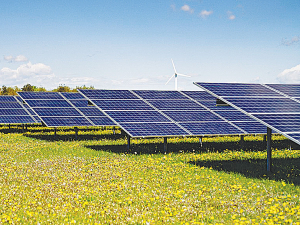Arla Foods delivers $15b revenue as Co-op turns 25
European dairy giant Arla Foods celebrated its 25th anniversary as a cross-border, farmer-owned co-operative with a solid half-year result.
 Arla Foods will be using solar energy to meet one-third of its electricity consumption within two years.
Arla Foods will be using solar energy to meet one-third of its electricity consumption within two years.
European dairy giant Arla Foods will be using solar energy to meet one-third of its electricity consumption within two years.
The co-operative has inked a deal with renewable energy company Better Energy for the establishment of four new solar parks in Denmark.
Under the 10-year agreement, the dairy cooperative commits to purchase the majority of the electricity from the new solar parks.
This constitutes the largest supply agreement in Danish history on renewable energy without public funding.
The parks have an expected capacity of 250 GWh, corresponding to the annual energu consumption of 156,000 average Danish citizens, and enough to cover about one third of Arla Foods' electricity consumption in Denmark.
Arla is increasing its target for reducing emissions in operations and logistics from 30 to 63 per cent: the solar park deal is one of several initiatives to help Arla meet its new 2030 emissions reduction target for its internal value chains.
Hanne Søndergaard, executive vice president at Arla Foods, says it is proud to be one of the first farmer-owned dairy cooperatives in the world to have a 1.5°C target.
"The new solar parks will play an important role in our shift towards renewable electricity and low-energy solutions at Arla Foods," says Søndergaard.
"Our Danish sites from a major part of our operations, which is why we are very pleased to begin our transition towards green electricity in Denmark."
By the end of 2025, Arla Foods' electricity consumption in EU will come from renewable energy sources, with the majority through green power purchase agreements and investments in solar and wind projects. With this new collaboration, Arla says it is taking a major step towards self-sufficiency in green electricity.
"Arla and our farmer owners continuously invest in new initiatives all the way from cow to grocery store with the aim of reducing our emissions and energy consumption. These initiatives include climate checks on the farms, reduction of food waste, sustainable packaging and green energy sources," says Søndergaard.
As a significant part of Arla Foods' dairy sites and logistics emissions is directly linked to electricity consumption from dairy sites and logistics, the dairy cooperative continues to implement solutions in this area, adds Søndergaard.
"Our nearly 300 organic farmers and our biggest dairy sites in Denmark already run entirely on green electricity.
"The agreement with Better Energy is an important step in the right direction, and a way for Arla to contribute to the overal increase in Denmark's green energy production."
The first solar park is expected to start delivering electricity by early 2023, and all four parks are scheduled to supply electricity by early 2024. Better Energy is responsible for the construction, operation, and maintenance of the solar parks, which take up a total of 280 hectares of land.
Going Green
By the end of 2025, Arla Foods' electricity consumption in EU will come from renewable energy sources, with the majority through green power purchase agreements and investments in solar and wind projects.
The argeement is a major step for Arla towards achieving its target of having electricity consumption in Europe that is entirely reliant on renewable energy sources by the end of 2025.
Arla Foods' nearly 300 organic farmers and biggest dairy sites in Denmark already run entirely on green electricity.
Global trade has been thrown into another bout of uncertainty following the overnight ruling by US Supreme Court, striking down President Donald Trump's decision to impose additional tariffs on trading partners.
Controls on the movement of fruit and vegetables in the Auckland suburb of Mt Roskill have been lifted.
Fonterra farmer shareholders and unit holders are in line for another payment in April.
Farmers are being encouraged to take a closer look at the refrigerants running inside their on-farm systems, as international and domestic pressure continues to build on high global warming potential (GWP) 400-series refrigerants.
As expected, Fonterra has lifted its 2025-26 forecast farmgate milk price mid-point to $9.50/kgMS.
Bovonic says a return on investment study has found its automated mastitis detection technology, QuadSense, is delivering financial, labour, and animal-health benefits on New Zealand dairy farms worth an estimated $29,547 per season.
OPINION: Staying with politics, with less than nine months to go before the general elections, there’s confusion in the Labour…
OPINION: Winston Peters' tirade against the free trade deal stitched with India may not be all political posturing by the…